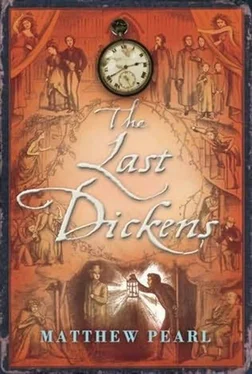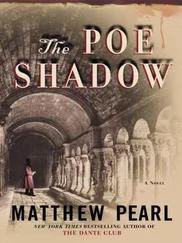“All the good in the world, Mr. Forster!” Osgood answered, adeptly bounding over Forster's negative tone. “If we could publish a special edition that exclusively reveals to American readers how Mr. Dickens's mystery was truly to be ended, we could overtake our swindling competition. But we have only a brief time to spend in England to find answers-or it shall be for naught. The pirates will have their hands on the rest of the known installments on the first of next month, and shall print the book to sell everywhere under the sun.”
“What do you mean, Osgood?” Forster leaned over with a distrustful scowl. He gripped the arms of the chair with his massive hands as though without such restraint he might fly at Osgood's throat. “Incredible! What do you mean when you said ‘how it was truly to be ended’?”
Osgood and Rebecca exchanged curious glances at the executor's heated reaction. “I mean, sir, how the mystery of the novel was to come out in the end.”
“Well, you don't have to tell me! That's clear enough, I think! John Jasper, the audacious villain of the book, leading his secret life of depravity, has cruelly killed his innocent nephew Edwin Drood. Isn't that most obvious to anyone with two eyes?”
“It certainly seems like it at the end of the sixth installment, yes,” Osgood agreed. “Yet our senior partner, Mr. Fields, has pointed out that Dickens might have had some other surprises behind the scenes for his reader in the subsequent six parts. Mr. Dickens did say in a letter to our offices that the book would be ‘curious and new.’
Forster shook his head. “Jasper was to confess his crime- this was the ‘curious and new’ notion of it. Why, Dickens told me himself.”
“Mr. Dickens told you?” asked Osgood.
Forster crossed his arms square over his chest and pushed out his thick lips in displeasure. “Perhaps I did not express my relationship with Mr. Dickens very clearly to you, Mr. Osgood. The annals of our friendship, perhaps, were not as celebrated across the ocean as they are here. I do not flatter myself to say that Mr. Dickens and I were on the closest terms, and though I am afraid he was not as open to counsel in regard to points of personal conduct, he confided nearly every detail of his books to me.”
“Well, he told me nothing about how the novel would end, even though I asked days before he died,” Georgina said, looking at Forster with suspicion.
“You asked him, too, Aunt Georgy?” Rebecca asked.
“Yes, dear. After I heard the installments read aloud to us as he wrote them, I said to him, ‘Charles, I hope you have not really killed poor Edwin Drood!’ He answered, ‘Georgy, I call my book the mystery , not the history , of Edwin Drood’-but he would not say more.”
“Monstrous!” Forster exclaimed, his broad brow now creased and snarled. “I wring my hands! Preposterous! That could mean anything, Miss Hogarth! Couldn't it?”
Georgy ignored the objection. “Mr. Osgood, Miss Sand. If you would like to look at the papers on his desks for yourselves, you are quite free to do so. In the summer months, he liked to write in our Swiss chalet. That is where he was working on his last day before coming inside the house and collapsing. A second desk stands in his library. I have not had the strength to do anything more than to keep his desks and drawers orderly.”
“Thank you, Aunt Georgy,” Osgood said.
“If you find anything that would help, we shall rejoice with you,” said Georgy.
Forster refolded his stumpy arms at the sentiment.
Osgood and Rebecca, led by an undergardener, crossed under the high road by the brick tunnel where the four big dogs lounged. A separate Swiss-style wooden chalet stood hidden by shrubbery and trees. In this small wooden sanctuary, they climbed a winding staircase to the top room.
THE REMOVED QUIET of Dickens's chalet was untouched by the auction preparations. On the walls of the summer study were five tall mirrors that reflected the trees and cornfields all the way down to the river in the distance and its faraway sails. The shadows of the clouds seemed to drift across the room.
“I can see why Mr. Dickens prized this place to write, away from everything else,” Rebecca commented when they entered.
At an open window stood an expensive telescope. Osgood pressed his eye against its lens. Deep in the meadows by the hop fields was a tall, hatless man with wild hair who somehow seemed to be looking up into their window. Osgood shifted the telescope to the hilltop and found the Falstaff Inn and could see its proprietor out by the stables. As he combed the mane of one of the horses, the landlord pinched his eyes as though in a fit of dreamy melancholy. It seemed every corner of the world around Gadshill had been made bleak by Dickens's death.
The register on the desk was still on June 8, the day Dickens had last sat and wrote. Also crowding the desk were several quill pens and inkwells, a memorandum slate, various trinkets including two bronze frogs, and a stack of slips of blue stationery covered with writing in blue ink.
“This is it,” Osgood said with awe of the latter object, sitting on the dusty chair. “The first six installments of The Mystery of Edwin Drood in his own hand, with corrections from the printer in the margins.” He gently fingered the edges of the pages. Dickens's handwriting, not always neat, was strong and dynamic. It did not seem to be written to be read by anyone other than the writer-printers and compositors be damned. Usually when Osgood saw the working space of one of his authors, the revelation was purely mechanical, like visiting the dusty floor of a factory. It had become too common, in fact, that when he finally met an author he had held in high esteem, the result was disappointment in the ordinariness of the person behind the words. But with Dickens there had always been a magical feeling, as though Osgood were not the seasoned publisher of Boston but once again a college lad from Maine or that shop boy on his first day in the Old Corner in an India rubber apron streaked with ink. To this day, even with Dickens now gone, he was still excited to be Dickens's publisher.
“Are you ready?” Osgood asked, inhaling it all. “Let us begin, Miss Sand.”
Time for the researchers over the next few days was broken up by short respites and occasional interruptions from the outside world. The most notable one came as they continued the next morning. They had by this point found a few small gems in the vast spread of materials. Osgood had discovered an early page of Dickens's notes that listed titles before the novelist had settled on The Mystery of Edwin Drood: Flight and Pursuit, One Object in Life, Dead? or Alive? He had been dictating these to Rebecca before he stopped in midsentence.
“Mr. Osgood?”
“My apology, Miss Sand. My eye was drawn away by that. Rather grotesque little thing, isn't it?” On the chimneypiece, there sat a light yellow plaster figure. It depicted an Oriental man with a jaunty fez smoking from a pipe, sitting cross-legged on a settee. Osgood picked it up and held it out at arm's length as he examined it. It was heavier than it looked.
Just then, a man rushed up the stairs of the chalet and into the study. The intruder wore a ragged suit and wild uncovered hair over a sunburned face. It was the same man the publisher had seen through the telescope walking through the hop fields the day before. His mouth was agape as though in some kind of sudden terror, and he grabbed Osgood's arm.
“Do you need some help, sir?” Osgood said.
The man studied the publisher with searching eyes. He held out his other hand to Osgood and kept it outstretched.
Cautiously, Osgood put his own hand up to shake. The stranger grabbed it with both hands and pressed hard. Rebecca gasped.
Читать дальше












